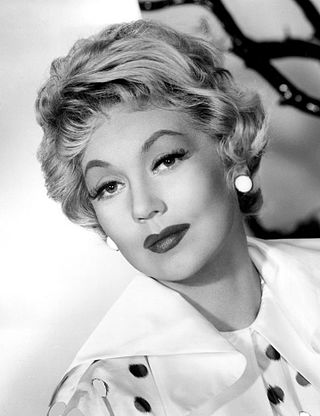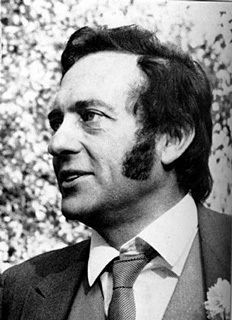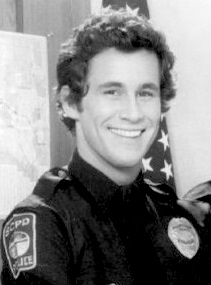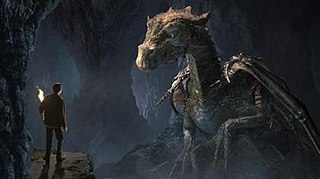Related Research Articles

Harold Clayton Lloyd Sr. was an American actor, comedian, and stunt performer who appeared in many silent comedy films.

George Edward Cole, OBE was an English actor whose career spanned 75 years. He was best known for playing Arthur Daley in the long-running ITV comedy-drama show Minder and Flash Harry in the early St Trinian's films.

Ann Sothern was an American actress who worked on stage, radio, film, and television, in a career that spanned nearly six decades. Sothern began her career in the late 1920s in bit parts in films. In 1930, she made her Broadway stage debut and soon worked her way up to starring roles. In 1939, MGM cast her as Maisie Ravier, a brash yet lovable Brooklyn showgirl. The character proved to be popular and spawned a successful film series and a network radio series.

Harry H. Corbett was an English actor and comedian, best remembered for playing rag-and-bone man Harold Steptoe alongside Wilfrid Brambell in the long-running BBC television sitcom Steptoe and Son. His success on television led to appearances in comedy films including The Bargee (1964), Carry On Screaming! (1966) and Jabberwocky (1977).

"Mr. Monk and the Candidate" is the two-part pilot episode of the American comedy drama detective television series Monk. It introduces the character of Adrian Monk, a private detective with obsessive–compulsive disorder and multiple phobias, and his assistant Sharona Fleming, as well as police officers Leland Stottlemeyer and Randy Disher. In this episode, Monk investigates an assassination attempt on a mayoral candidate.

Georgina Hale was a British actress. In a career spanning six decades, her credits include work in radio, stage, film, and television. She was the recipient of such accolades as a British Academy Film Award, in addition to a nomination for a Laurence Olivier Award. In 2010, she was listed as one of ten great British character actors by The Guardian.

Alice Margaret Ghostley was an American actress and singer on stage, film and television.

In films, an intertitle, also known as a title card, is a piece of filmed, printed text edited into the midst of the photographed action at various points. Intertitles used to convey character dialogue are referred to as "dialogue intertitles", and those used to provide related descriptive/narrative material are referred to as "expository intertitles". In modern usage, the terms refer to similar text and logo material inserted at or near the start or end of films and television shows.

Edward Paul Flanders was an American actor. He is best known for playing Dr. Donald Westphall in the medical drama series St. Elsewhere (1982–1988). Flanders was nominated for eight Primetime Emmys and won three times in 1976, 1977, and 1983.

Michael Ontkean is a Canadian retired actor, long-based in the United States. Born and raised in Vancouver, British Columbia, Ontkean relocated to the United States to attend the University of New Hampshire on a hockey scholarship before pursuing a career in acting in the early 1970s.

Michael John Elphick was an English film and television actor. He played the eponymous private investigator in the ITV series Boon and Harry Slater in BBC's EastEnders. He was nominated for a BAFTA Award for Best Supporting Actor for his performance in the 1983 film Gorky Park. With his gruff Sussex accent and lip-curling sneer, he often played menacing hard men.

Paul Mackriell Copley is an English actor and voice over artist. From 2011 to 2015 he appeared as Mr. Mason, father of William Mason, in 16 episodes of Downton Abbey, and from 2020 to 2021, he appeared in the ITV soap opera Coronation Street as Arthur Medwin.
Adrian Philip Scarborough is an English actor.

Margaret Constance "Maisie" Williams is an English actress. Williams made her acting debut in 2011 as Arya Stark, a lead character in the HBO epic medieval fantasy television series Game of Thrones (2011–2019). She gained recognition and critical praise for her work on the show, and received two Emmy Award nominations. Williams' other television appearances include Ashildr in the BBC science fiction series Doctor Who (2015), starring in the British docudrama television film Cyberbully (2015), and in the British science-fiction teen thriller film iBoy (2017). She played the central character in the comedy action drama miniseries Two Weeks to Live (2020), and portrayed punk rock icon Jordan in Pistol (2022), a biopic about the Sex Pistols. Williams also voiced Cammie MacCloud in the American animated web series Gen:Lock (2019–2021).

"The Dragon's Call" is the first episode of the first series of the British fantasy-adventure family television series Merlin. Written by Julian Jones and directed by James Hawes, the episode was first broadcast on BBC One on 20 September 2008.

Rock & Chips is a British television comedy-drama miniseries and a prequel to the sitcom Only Fools and Horses. The show is set in Peckham, southeast London, during the early 1960s, focusing primarily on the lives of Del Trotter, Freddie Robdal and Joan and Reg Trotter. Nicholas Lyndhurst, who played Rodney in Only Fools and Horses, plays Robdal alongside James Buckley, Kellie Bright (Joan), Shaun Dingwall (Reg) and Phil Daniels (Grandad). The Shazam and BBC Studios Comedy Drama co-production was written by Only Fools and Horses creator John Sullivan, directed by Dewi Humphreys and produced by Gareth Gwenlan.
"Ghost of a Chance" is the second episode of the first season of the American police drama television series Homicide: Life on the Street. It originally aired on NBC in the United States on February 3, 1993. The teleplay was written Noel Behn based on a story by executive producer Tom Fontana, and the episode was directed by Martin Campbell. In it Bayliss begins his investigation into the murder of 11-year-old Adena Watson, Munch and Bolander investigate the unusual death of an elderly man, and Howard insists she is receiving advice about her murder case from a ghost.
Rhys Adrian Griffiths was a British playwright and screenwriter. He is best known for his radio plays, which are characterised by their emphasis upon dialogue rather than narrative.
Jenny Twigge is a British actress who studied at the Royal Scottish Academy of Music and Drama, Glasgow. She was a patron of animal rescue group All Dogs Matter.
The second series of the British comedy-drama television series Cold Feet was first broadcast on the ITV network from 26 September to 31 October 1999. The six episodes were written by series creator Mike Bullen, produced by Christine Langan, and directed by Tom Hooper, Tom Vaughan and Pete Travis. The storylines focus on three couples: Adam Williams and Rachel Bradley, Pete and Jenny Gifford, and David and Karen Marsden who are played by James Nesbitt, Helen Baxendale, John Thomson, Fay Ripley, Robert Bathurst and Hermione Norris respectively.
References
- ↑ Tom Hutchinson, Play for Today: "no softening up", Radio Times , 24–30 April 1971
- ↑ Mary Malone, "Caught starkers in the wardrobe", Daily Mirror , 30 April 1971
- ↑ T.C. Worsley, "Begging to Differ", Financial Times, 5 May 1971
- ↑ Martin Jackson, 'Great talent — but who lost the plot?', Daily Express, 24 April 1971
- ↑ Peter Fiddick, 'Foxtrot', The Guardian, 30 April 1971
- ↑ Sean Day-Lewis, "Tragi-comedy of triangle that survived", The Daily Telegraph, 30 April 1971
- ↑ "The Foxtrot". lostshows. Retrieved 23 October 2020.